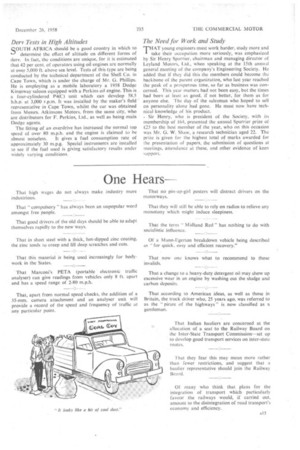One Hears
Page 17

If you've noticed an error in this article please click here to report it so we can fix it.
That high wages do not always make industry more industrious.
That good drivers of the old days should be able to adapt themselves rapidly to the new ways.
That in sheet steel with a thick, hot-dipped zinc coating, the zinc tends to creep and fill deep scratches and cuts.
That this material is being used increasingly for bodywork in the States.
That Marconi's FETA (portable electronic traffic analyser) can give readings from vehicles only 8 ft. apart and has a speed range of 2-80 m.p.h.
That, apart from normal speed checks, the addition of a 35-mm. camera attachment and an analyser unit will provide a record of the speed and frequency of traffic at any particular point. That no pin-up-girl posters will distract drivers on the motorways.
That they will still be able to rely on radios to relieve any monotony which might induce sleepiness.
That the term "Midland Red" has nothing to do with socialistic influence.
Of a Mann-Egerton breakdown vehicle being described as for quick, easy and efficient recovery."
That now one knows what to recommend to those invalids.
That a change to a heavy-duty detergent oil may show up excessive wear in an engine by washing out the sludge and carbon deposits.
That according to American ideas, as well as those in Britain, the truck driver who, 25 years ago, was referred to as the " pirate of the highways" is now classified as a gentleman.
That Indian hauliers are concerned at the allocation of a seat to the Railway Board on the Inter-State Transport Commission—set up to develop good transport services on inter-state routes.
That they fear this may mean more rather than fewer restrictions, and suggest that a haulier representative should join the Railway Board.
Of many who think that plans for the integration of transport which particularly favour the railways would, if carried out, amount to the disintegration of road transport's economy and efficiency.








































































